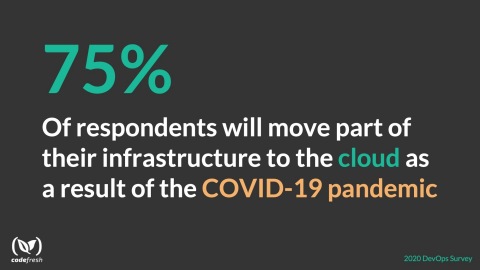MOUNTAIN VIEW, Calif.--(BUSINESS WIRE)--Codefresh conducted its second annual State of DevOps survey that revealed surprising insights into the continued evolution of the industry. Most significantly, yet not surprising, is that, for many respondents, COVID-19 has had a massive effect, leading to large-scale migrations away from on-premises environments.
At the same time, DevOps automation continues to expand in scope and complexity with more and more processes becoming automated, and more involved technologies like Kubernetes continuing to gain strong traction. While it has improved some year-over-year, most organizations are still struggling with implementing and maintaining automation. Details were announced during the 2020 KubeCon + CloudNativeCon Europe Virtual event.
Key takeaways from the survey include:
- COVID-19 has led many to reconsider their on-prem infrastructure strategy
Codefresh asked how COVID-19 has affected DevOps professional’s plans to reconsider their on-prem infrastructure strategy, with somewhat surprising results. 58% of respondents saying that due to the pandemic, they are planning on moving some infrastructure to the cloud with 17% of respondents planning to move their entire stack to the cloud.
In total, about 75% of respondents said that they are moving at least part of their infrastructure to the cloud as a result of the COVID-19 pandemic, representing a dramatic shift in strategy and further adoption towards the cloud.
- DevOps budgets are going up in 2020
74% of respondents are expecting an increase and more than half are expecting their budgets to increase by 25% or more.
Organizations are continuing to invest heavily in their DevOps budgets as the effect of DevOps on developer velocity and site reliability continues to be better understood.
- Most companies are still struggling with commit-to-production automation (although it’s getting better)
If your organization is struggling with complete commit-to-production automation, you’re not alone. Automation proves to be elusive as less than 5% of respondents claimed that all of their company’s DevOps processes are automated from Git commit to code running in production.
52% of respondents have less than 50% of their organization’s DevOps process automated from Git commit to production. This is down from last year’s survey, where 66% of respondents had less than 50% of their processes automated. This represents the continued trend away from manual processes as organizations build out their DevOps automation.
- Kubernetes continues to build momentum, with most thinking that it will be used on more than half of new projects by the end of 2020
73% of respondents said that they believe that by the end of 2020, more than half of new projects will use Kubernetes.
In 2019’s survey, 54% of respondents said that Kubernetes would be used in more than half of all projects by the end of the year. Clearly, Kubernetes adoption is continuing to accelerate.
75% of respondents said that they have either already adopted Kubernetes or are planning to adopt Kubernetes soon.
- 67% of DevOps engineers spend over a quarter of their time just fixing bugs in their automated systems
67% of respondents said that they spend 25% or more of their time fixing bugs in their automated systems, while 35% of respondents spend 50% or more of their time fixing bugs in their automated systems.
This highlights the importance of choosing a well-architected DevOps automation stack, as the platform you use can have a massive impact on the amount of time lost to bug fixing.
Codefresh’s CI/CD platform provides automation for building, testing and deploying modern applications using Kubernetes, serverless and more. Development teams often see 24x faster engineering cycles when using Codefresh. The company just released its Codefresh Runner for an easy way to run and maintain CI/CD infrastructure, as well as $27 Million in funding to power software delivery to Kubernetes.
About Codefresh
Founded in 2014 by Raziel Tabib and Oleg Verhovsky, Codefresh is the first DevOps automation platform. After launch in 2017, Codefresh has gained tens of thousands of users. Unlike legacy solutions, Codefresh pipelines are uniquely designed for cloud-native technologies like Kubernetes, Terraform, and Helm. Codefresh is headquartered in Mountain View, CA and backed by world-class investors: M12, Microsoft’s venture fund, Red Dot Capital Partners, Shasta Ventures, Viola Ventures, Vertex Ventures, Hillsven, CEIIF, UpWest Labs and Streamlined Ventures. Learn more about Codefresh at https://codefresh.io/. Follow on LinkedIn and Twitter at @codefresh.




